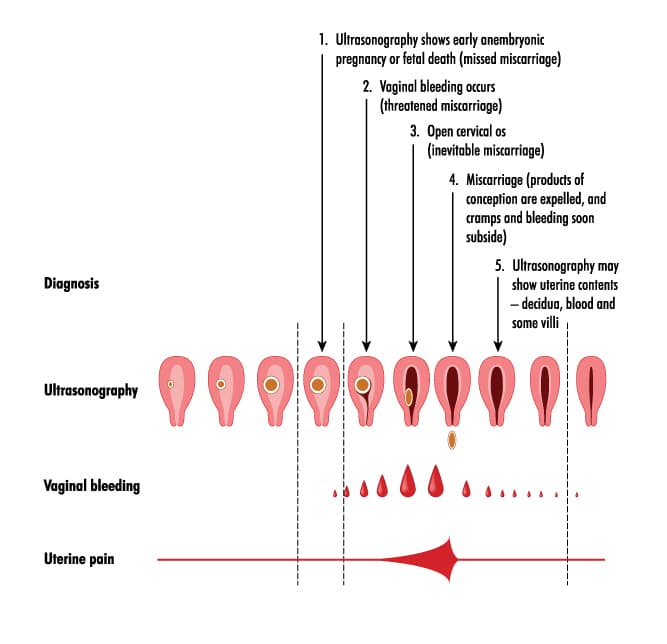What is a miscarriage?
A miscarriage is the spontaneous, or unplanned expulsion of an embryo or foetus before the age of viability. The age of viability is the age at which a foetus if born, can survive and live independent of the mother. The age of viability in Nigeria is pegged at 28 completed weeks, that is 6 months + 2 weeks. What this means is that any delivery that occurs before 28 weeks in Nigeria, is a miscarriage unless it is induced, then it’d be an “abortion.
Types or stages of miscarriages
What we refer to as “types” of miscarriage, are actually, more or less, stages of a miscarriage. This is because the events that culminate in the expulsion of the fetus ideally occur in sequence on a continuous spectrum. With this in mind, Bearing this in mind, the “types” of miscarriage include;
- Threatened
- Inevitable
- Incomplete
- Complete
- Missed

Threatened Miscarriage
This usually manifests as PAINLESS vaginal bleeding. At this stage, the pregnancy is literally threatening to terminate, and if care is not taking, it may make good the threat. Apart from the bleeding, there’s usually no other symptom [ a slight, cramp-like, abdominal pain may be present though]. On vaginal examination, the cervix is usually closed. What is important to note here is that at this stage it is still possible to halt the process, depending on the underlying inciting factor for the miscarriage.
Inevitable Miscarriage
At this stage, the miscarriage is bound to happen. Hence the term “inevitable.”This is because, contraction of the womb has intensified enough to cause changes in the cervix, and with time will be strong enough to cause expulsion of the fetus. The major symptoms are usually severe lower abdominal pain and an open cervix. There may be slight vaginal bleeding, or not. It is important to note that, as long as the cervix is open, it is just a matter of time before the baby would be expelled. Whether the baby’s heart is still beating, or not, is immaterial. This is because if it is delivered, it won’t be able to survive, and would just be an abortus.
Incomplete Miscarriage
At this stage, the process of actual expulsion of the fetus is already ongoing, but incomplete; and some parts of the conceptus may have been passed. So, once fleshy materials, which are products of conception, have been passed, it is no longer an inevitable miscarriage. Sometimes, nothing may have been passed. However, on vaginal examination, the cervix would be found to be clogged with products of conception in the process of being expelled. An incomplete miscarriage is the most dangerous stage of miscarriage for the following reasons;
- If there’s something clogging the cervix, or there are still remnants in the womb, it won’t be able to retract and clamp down on angry blood vessels to arrest the bleeding. The patient will thus continue bleeding and may exsanguinate unless of course timely intervention is instituted.
- If the remnants are not passed passively or evacuated actively, they may become retained and form a nidus for infection, leading to sepsis. Features of an ongoing incomplete miscarriage include severe abdominal pain, heavy vaginal bleeding, and a clogged cervical os. Features of retained products– days to weeks after a miscarriage is thought to have been completed– include fever, continued abdominal pain, spotting, and copious vaginal discharge.
Complete Miscarriage
Incomplete miscarriage, the fetus, and the whole products of conception have been completely expelled successfully. The hallmark is that all the symptoms of miscarriage– including abdominal pain, and vaginal bleeding — usually resolves. It is however still advisable for a confirmatory ultrasound to be done, just to be on the safe side.
Missed Miscarriage
When a fetus dies inside the womb before the age of viability, taking everyone unawares, without any overt signs, the miscarriage is said to have been “missed” by everyone. Most times, “missed miscarriages” are discovered incidentally during a routine ultrasound scan- days to weeks, or even months, after the miscarriage had occurred. However, there are certain clues that may point towards a missed miscarriage, and they include the waning of pregnancy symptoms and cessation of growth of the baby bump. When discovered, a missed miscarriage is usually evacuated. The method of evacuation depends on how old the pregnancy was before it stopped growing.
It is important to note that not all miscarriages go through all these stages. Some may bypass the stage of threatening and move straight to the stage of inevitable miscarriage.
About the author
Dr Chibuike Joseph Chukwudum is a doctor who Studied Medicine and Surgery at Nnamdi Azikiwe University Awka. He is the former Medical Officer at Oakland specialist hospital,obosi.He also previously worked at Nnamdi Azikiwe University Teaching Hospital, Nnewi, Anambra State.


